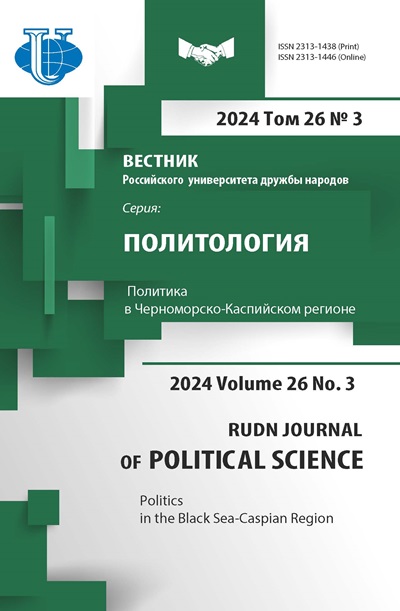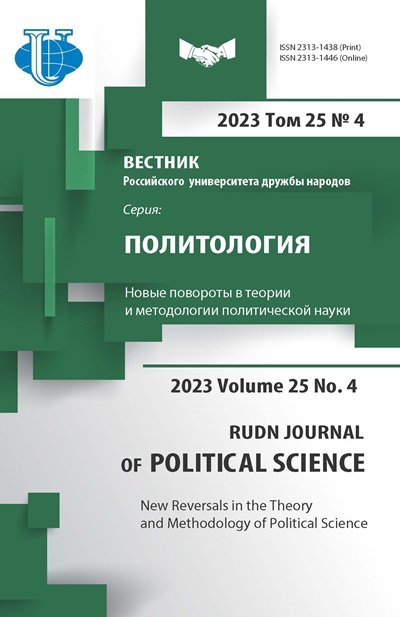The «Situational Nationalism»: A New Age of Nation and State Building in Montenegro?
- Authors: Meleshkina E.Y.1, Pomiguev I.A.1,2,3
-
Affiliations:
- Institute of Scientific Information for Social Sciences of the RAS
- HSE University
- Financial University under the Government of the Russian Federation
- Issue: Vol 25, No 4 (2023): New Reversals in the Theory and Methodology of Political Science
- Pages: 778-800
- Section: THE WORLD OF THE POLITICAL
- URL: https://journals.rudn.ru/political-science/article/view/37382
- DOI: https://doi.org/10.22363/2313-1438-2023-25-4-778-800
- EDN: https://elibrary.ru/QLFGYI
Cite item
Full Text
Abstract
For a long time, the political development of Montenegro has been determined by the peculiarities of historical development and the legacy of the former Yugoslavia. The divisions between groups of citizens identifying themselves as Serbs or Montenegrins, as well as contradictions between the state and the church, have determined the configuration of political forces. The fear of national minorities of Serbian national policy and the skillful maneuvering of M. Djukanovic contributed to their support for his regime. However, the problems of economic development, Djukanovic’s miscalculations regarding the Orthodox Church, as well as the lack of serious progress on the way to the EU, led to an increase in opposition sentiment and the defeat of Djukanovic in 2023 presidential elections, and the DPS in the parliamentary ones. Representatives of the younger generation of politicians came to power in Montenegro, relying to a lesser extent on traditional ethno-confessional divisions for Montenegro and aimed at solving economic problems and accelerating the process of the country’s accession to the EU. The article concludes that the end of a long period of dominance of one political force does not mean the end of the process of democratization. The unresolved issues of national and state building, the influence of external centers, the lack of effective institutions for the achievement of compromise and the protection of the interests of minorities make political life unstable and complicate the adoption of effective political decisions. Despite the victory of a new generation of politicians in the last national elections, the country’s traditional divisions still determine the choice of many voters and may again become relevant under the influence of market circumstances.
About the authors
Elena Yu. Meleshkina
Institute of Scientific Information for Social Sciences of the RAS
Email: elenameleshkina@yandex.ru
ORCID iD: 0000-0003-1339-7150
Doctor of Political Science, Chief Researcher
Moscow, Russian FederationIlya A. Pomiguev
Institute of Scientific Information for Social Sciences of the RAS; HSE University; Financial University under the Government of the Russian Federation
Author for correspondence.
Email: pomilya@mail.ru
ORCID iD: 0000-0003-3068-5664
PhD in Political Sciences, Associate Professor at the School of Politics and Governance, Faculty of Social Sciences, HSE University; Research Fellow at the Institute of I nformation for Social Sciences of the Russian Academy of Sciences; Associate Professor at the Department of Political Science, Faculty of Social Sciences and Mass Communication, Financial University under the Government of the Russian Federation
Moscow, Russian FederationReferences
- Allworth, E. (1994). Muslim communities reemerge: historical perspectives on nationality, politics, and opposition in the former Soviet Union and Yugoslavia. Duke university press.
- Bakrač, V. (2022). Church and state in Montenegro: From the Serbian Orthodox Church to the Church of Serbia. Occasional Papers on Religion in Eastern Europe. 42(9), 38–52.
- Banchev, B. (2021). The Serbian Orthodox Church in Montenegro and the conflict of identities in 2019–2020. Études balkaniques, 2021, 4, 566–591.
- Bartolini, S. (2005). Restructuring Europe: centre formation, system building, and political structuring between the Nation State and the European Union. Oxford: Oxford University Press.
- Begović, M., Bardocz-Bencsik, M., Oglesby, C.A., & Dóczi, T. (2021). The impact of political pressures on sport and athletes in Montenegro. Sport in Society, 24(7), 1200–1216. https://doi.org/10.1080/17430437.2020.1738393
- Bieber, F. (2010). The party system of Montenegro, party politics in the Western Balkans. In V. Stojarova & P. Emerson (Eds.), Abingdon, New York: Routledge.
- Brubaker, R. (2012). Ethnicity without groups. Moscow: HSE Publishing House. (In Russian).
- Jenne, K.E., & Bieber F. (2014). Situational nationalism: Nation-building in the Balkans, subversive institutions, and the Montenegrin Paradox. Ethnopolitics, 13(5), 431–60.
- Kaufmann, D., Hellman, J., & Geraint, J. (2000). Seize the state, seize the day: State capture. corruption, and influence in transition. Policy Research Working Paper 244. World Bank. Retrieved July 12, 2023, from https://openknowledge.worldbank.org/handle/10986/19784
- Komar, O. (2019). The elephant in the room: Illiberal politics in Montenegro. Southeast European and Black Sea Studies, 21, 61‒80. https://doi.org/10.1080/14683857.2020.1703495
- Meleshkina, E.Yu. (2012). Formation of new states in Eastern Europe. Moscow: INIO NRA N. (In Russian).
- Meleshkina, E.Yu. (2013). Post-imperial spaces: Features of the formation of states and nations. Political science (RU), 3, 10‒29. (In Russian).
- Meleshkina, E.Yu., & Pomiguev I.A. (2021). Montenegro in search of national and state identity. Bulletin of Perm University. Political Science, 15(1), 5–18. (In Russian). http://doi.org/10.17072/2218-1067-2021-1-5-18
- Milosevich, M. (2020). Russia’s weaponization of tradition: The case of the Orthodox Church in Montenegro. Center for International and Strategic Studies. Retrieved July 12, 2023, from https://www. csis.org/blogs/post-soviet-post/russias-weaponization-tradition-case-orthodox-church-montenegro
- Morrison, K. (2018). Nationalism, identity and statehood in Post-Yugoslav Montenegro. London: Bloomsbury.
- Pavlović, S. (2003). Who are Montenegrins? Statehood, identity, and civic society. In F. Bieber (Ed.), Montenegro in transition problems of identity and statehood (pp. 83‒106). Baden Baden: Nomos Verlagsgesellschaft.
- Pavlović, S. (2016). Montenegro’s stabilitocracy: The West support of Đukanović is damaging the prospects of democratic change. LSE Blog. Retrieved July 12, 2023, from https://blogs.lse.ac.uk/europpblog/2016/12/23/montenegros-stabilitocracy-how-the-westssupport-of-dukanovic-is-damaging-the-prospects-of-democratic-change/
- Pomiguev, I.A., & Salakhetdinov, E.R. (2021). The memory policy of the Second
- Popescu, G. (2012). Bordering and ordering the twenty-first century. Understanding borders. Rowman and Littlefield.
- Rokkan, S. (1987). The center-periphery polarity, center periphery structures in Europe: An ISSC Workbook in Comparative Analysis (pp. 17–50). Frankfurt A.M. and N.Y.: Campus Verl.
- Rokkan, S., & Flora, P. (Ed.). (1999). State formation, nation-building, and mass politics in Europe: The theory of Stein Rokkan. Oxford: Oxford university press.
- Schimmelfennig, F. (2021). Rebordering Europe: External boundaries and integration in the European Union. Journal of European public policy, 28(3), 311–330. http://doi.org/10.1080/13501763.2021.1881589
- Šljivić, D. (2021). Montenegro’s canonical Orthodox Church and transition to democracy in the aftermath of the 2020 Parliamentary Elections. Südosteuropa Mitteilungen, 1, 47–61.
- Subotić, J. (2019). The church, the nation, and the state: the Serbian Orthodox Church after communism. In S.P. Ramet (Ed.), Orthodox churches and politics in Southeastern Europe, Palgrave studies in religion, politics, and policy (pp. 85-110). https://doi.org/10.1007/978-3-030-24139-1_5
- Vučković, V., & Petrović, M. (2022). Colliding western Balkan Neighbors: Serbia and Montenegro in Post-Yugoslav context — identity and interest representation. Southeastern Europe. L’Europe du Sud-Est, 9, 54–80. https://doi.org/10.25364/02.9:2022.2.5
- Vukicevic, B. (2017). Foreign relations of postindependence Montenegro: a change of direction. Lithuanian foreign policy review, 36, 107‒135. https://doi.org/10.1515/lfpr2017-0003
- World War in the post-Yugoslav republics: Symbolic and commemorative aspects. RUDN Journal of Political Science, 23(4), 659–674. (In R ussian). http://doi.org/10.22363/2313-1438-2021-23-4-659-674
















